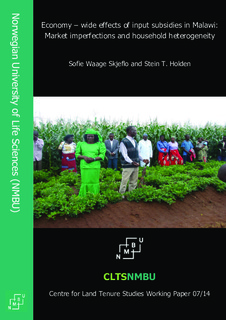| dc.contributor.author | Skjeflo, Sofie Waage | |
| dc.contributor.author | Holden, Stein Terje | |
| dc.coverage.spatial | Malawi | nb_NO |
| dc.date.accessioned | 2018-01-24T12:52:49Z | |
| dc.date.available | 2018-01-24T12:52:49Z | |
| dc.date.issued | 2014 | |
| dc.identifier.uri | http://hdl.handle.net/11250/2479426 | |
| dc.description.abstract | The potential benefits of providing subsidized inputs to farm-households in developing countries may reach well beyond the targeted households. More specifically, increased food productionand demand for rural labor may benefit poor households through lower food prices and higherrural wages. However, two recent studies of a large input subsidy program in Malawi find thatthese effects are smaller than expected based on anecdotal evidence and previous studies usingsimulation models. In this paper we provide a potential explanation for this finding by usingsix farm-household programming models to show how market imperfections limit households’ability to take advantage of cheaper inputs. Our findings suggest that input subsidy programscould be combined with improved market infrastructure and market access in order to increasenon-beneficiary households’ benefits from input subsidies. | nb_NO |
| dc.description.sponsorship | CIMMYT | nb_NO |
| dc.language.iso | eng | nb_NO |
| dc.publisher | Norwegian University of Life Sciences, Ås | nb_NO |
| dc.relation.ispartofseries | CLTS Working paper;2014:7 | |
| dc.rights | Attribution-NonCommercial-NoDerivatives 4.0 Internasjonal | * |
| dc.rights.uri | http://creativecommons.org/licenses/by-nc-nd/4.0/deed.no | * |
| dc.title | Economy-wide effects of input subsidies in Malawi : market imperfections and household heterogeneity | nb_NO |
| dc.type | Working paper | nb_NO |
| dc.subject.keyword | Subsidies | |
| dc.subject.keyword | Farms | |
| dc.subject.keyword | Households | |

